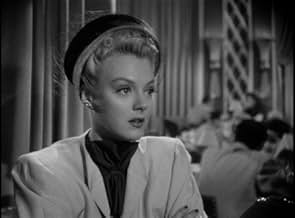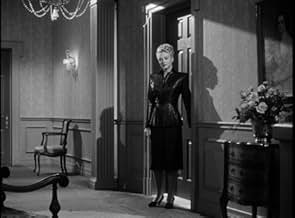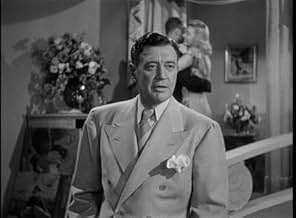Un artista sposato con una donna ricca e malata ha una relazione con una sua modella. La moglie la scopre e minaccia di escluderlo dal testamento. Per poter tenere sia i soldi che la ragazza... Leggi tuttoUn artista sposato con una donna ricca e malata ha una relazione con una sua modella. La moglie la scopre e minaccia di escluderlo dal testamento. Per poter tenere sia i soldi che la ragazza, inizia ad avvelenare sua moglie.Un artista sposato con una donna ricca e malata ha una relazione con una sua modella. La moglie la scopre e minaccia di escluderlo dal testamento. Per poter tenere sia i soldi che la ragazza, inizia ad avvelenare sua moglie.
- Regia
- Sceneggiatura
- Star
- George
- (non citato nei titoli originali)
- Messenger Boy
- (non citato nei titoli originali)
- Artist
- (non citato nei titoli originali)
- Henry Loring
- (non citato nei titoli originali)
- Whistler
- (non citato nei titoli originali)
- Jorgensen
- (non citato nei titoli originali)
- McLaren aka Mac
- (non citato nei titoli originali)
- Butler
- (non citato nei titoli originali)
- Girl
- (non citato nei titoli originali)
- Detective Lieutenant
- (non citato nei titoli originali)
- Girl
- (non citato nei titoli originali)
Recensioni in evidenza
This is a tale about a mediocre middle aged artist, (Richard Dix as Ralph Harrison) married to a middle-aged wealthy wife (Mary Currier as Edith Harrison). The first scene sets us up for the macabre nature of the tale to come. A woman is ordering an expensive headstone - even in 1946 it will cost five thousand dollars . The stonemason is telling her it will take three months to build such an expensive monument. She says that is OK. Then she gives the name to be put on the headstone - her own. You see, Edith is quite ill with a bad heart and has only months to live and she knows it.
Someone else here mentioned this as the tale of "the inconvenient wife", but it is not at all clear what Ralph's true feelings are for his wife, at least in the beginning. For sure he likes not having to sell sketches in the park, to be able to have his own studio and dabble even though he has no talent, and to entertain his "friends" who are actually just a bunch of parasitic hangers on. However, he seems genuinely troubled and saddened by the doctor's news that his wife has only weeks or months to live. His great misfortune is to befriend ace grifter Kay Morrell just to have someone to talk to during his time of trouble with his wife tied to a sick bed, and then he falls in love with her.
Ralph decides he really wants Kay, Kay really only likes Ralph's money, and Ralph really likes his money too, and he loses that if he divorces Edith. Normally he could just wait out Edith's illness to its inevitable conclusion, but then a monkey wrench is thrown into his plans - a young hot-shot doctor devises a state of the art treatment plan and Edith now has a second lease on life. I'll let you watch for yourself and see how all of this plays out.
This particular whistler entry is the essence of noir - an average man who is on an average man's path until something unexpected comes along, and suddenly that forbidden fruit just looks to good to pass up. Surely he can get away with a bite out of that fruit just once...or not.
Like I said earlier, Dix did an outstanding job in this one. You never really know what his true feelings are deep in his heart, since he plays his cards close to his vest in his role as Ralph and he is fascinating to watch. Kudos also go out to Claire Du Brey who has her Mrs. Danvers like role down pat as the loyal servant of Edith, and also to Leslie Brooks as Kay Morrell who is beautiful and cold as ice as the femme fatale. A highly recommended little B noir.
Nonetheless, the story keeps us watching. As usual we can't be sure how events will turn out since Dix's character is as morally compromised as in the other entries. Unlike other Hollywood films of that era, there is no one to root for as the plot unfolds. Thus, it's the story itself that holds our interest, and not the more predictable question of how a hero will triumph. Fortunately, the ending comes up with the usual fine touch of irony that fans expect.
There's an expertly shaded performance by Mary Currier as Dix's star-crossed wife. Watch the subtlety of her expressions as she learns about her wayward husband. The series itself did not depend on subtle acting-- and certainly Dix doesn't manage the Lothario role very well. Nonetheless, Currier delivers an A-grade performance. (In passing-- I expected the screenplay to develop the scheming relationship between blonde model Kay and her effete boyfriend Jim more fully than it did. That could have set up an interesting dynamic of those schemers competing against another schemer, Dix.) Anyway, stylish or not, this remains a very watchable hour of frustrated passion and the hand of fate.
voice-over narration, but the "star" of the films is Richard Dix, who plays a different role in each--some heroic, some cowardly, some honorable, some not so honorable. This must have been satisfying to Dix, since it gave him regular work AND allowed him to show his talent in a wide variety of roles. This particular entry gives Dix a complex role, as an artist married to a rich woman whose financial support allows him to continue his work. The plot is more complex than the synopsis suggests, and there are a number of twists and turns throughout, giving the film the feel of an episode of Alfred Hitchcock Presents. The "femme fatale" in this film is played by Leslie Brooks, who took this kind of role even further in the great BLONDE ICE two years later. Director George Sherman did a lot of exciting films at Republic prior to this film at Columbia, including many entries in the Three Mesquiteers series, and went on to do many more films, including episodes of such classic TV shows as Rawhide and Naked City. The centerpiece of the film, though, is Richard Dix, an actor of great presence (it's fair to say that Gary Cooper was influenced by Dix)and subtlety. SECRET OF THE WHISTLER would be a good introduction to this series, and it should appeal to any fan of INNER SANCTUM, THRILLER, ALFRED HITCHCOCK PRESENTS, etc. Most of the other films in the series are worth checking out also. Perhaps sometime in the future Columbia could do a DVD boxset of the Whistler films the way Universal is doing the Francis and Ma&Pa Kettle films? And after that, perhaps they could reissue the Boston Blackie films?
Lo sapevi?
- QuizThis is the penultimate film of Richard Dix, being 99th out of the 100 he made.
- BlooperAfter Harrison's servant discovers Mrs Harrison lying on the floor, using the bedroom phone tells Loring she hangs up and then calls the doctor. But, the phone downstairs that she originally answered when Loring called is still off the hook and therefore she would not be able to make the call.
- Citazioni
Ralph Harrison: What's the matter, Darling?
Edith Marie Harrison: Stop acting, Ralph. There's nothing quite so contemptible as a hypocrite.
- ConnessioniFollowed by The Thirteenth Hour (1947)
- Colonne sonorePut The Blame On Mame
Written by Allan Roberts and Doris Fisher
Played during the party in Ralph's studio
I più visti
Dettagli
- Data di uscita
- Paese di origine
- Siti ufficiali
- Lingua
- Celebre anche come
- Секрет Свистуна
- Azienda produttrice
- Vedi altri crediti dell’azienda su IMDbPro
- Tempo di esecuzione1 ora 5 minuti
- Colore
- Proporzioni
- 1.37 : 1
Contribuisci a questa pagina
































